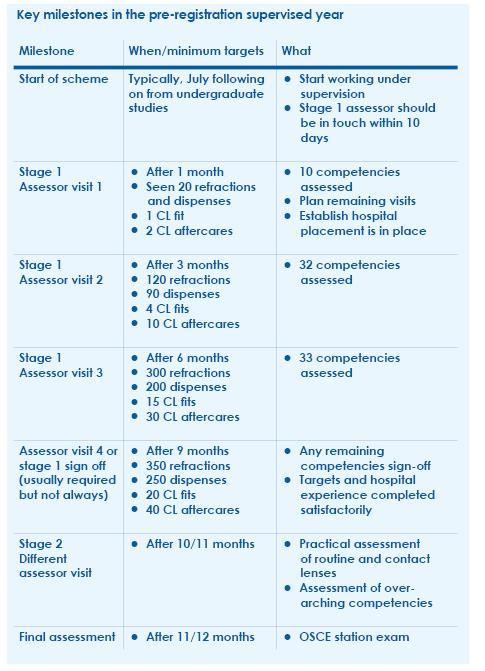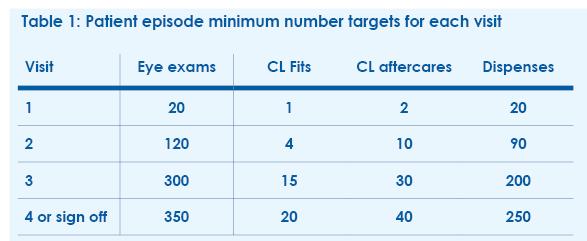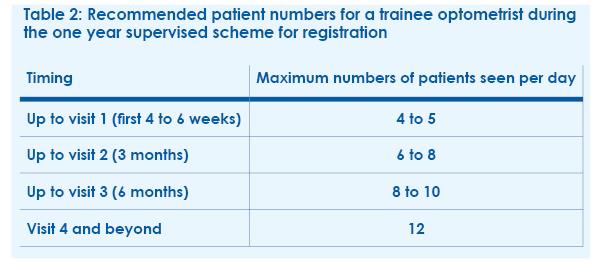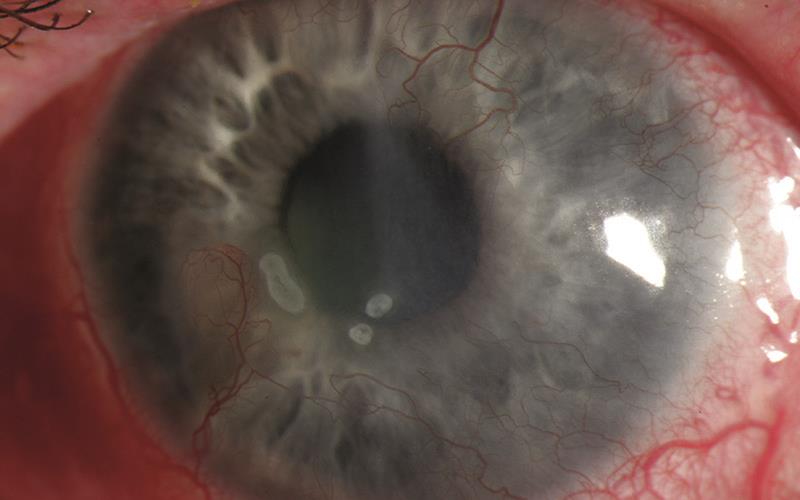- Guidance for Professional Practice
- Clinical Management Guidelines
- Optometrists' Formulary
- Clinical advice service
- Clinical files
- Guidance for therapeutics
- Supplementary guidance
- Using Evidence in Practice
- Position statements
- Ethical scenarios
- Introduction to CPD
- Online learning
- Peer discussion and peer review
- Docet distance learning
- Independent prescribing (IP) qualification
- Higher qualifications
- Ophthalmic and Physiological Optics (OPO)
- Optometry In Practice
- Career pathways in optometry
- Research Excellence Awards
- Financial support for College members undertaking research
- Library and information services
- Fellowship by Portfolio

Scheme for Registration
- New route to qualification
- Assessors, examiners and supervisors
- Optometry students
- International pre-registration trainees
- Sector Partnership for Optical Knowledge and Education (SPOKE)
- A career in optometry
- Join us today
- Membership categories and fees
- Request a change of membership category
- Full range of member benefits
- Reclaim your tax
- Member resources
- Locum resources
- Life and Honorary Fellowship (FCOptom)
- Taking a career break
- Member Code of Conduct
- The Benevolent Fund
- Shaping eye care
- Advancing optometry
- Championing the profession
- Patient leaflets and resources
- Get the College app
- Expert witnesses
- Compassion in practice
Guidance on visits, including assessments and outstanding competencies.
Visit three
Summary table, trainee logbook.
You must download your logbook to keep track of your patient encounters.
Essential documents
Download important documents for every stage of the Scheme
Supervision
How to arrange your supervision or change your practice.
The Scheme for Registration fees.
Advice and support
Extending or restarting the Scheme, reasonable adjustments, appeals and complaints.
Regulations, policies and reports
Scheme governance documents you should read.

- Supplements
Search menu
Survival guide to pre-reg stage 1: competency.
Over the first eight or nine months of your supervised pre-registration year, you will aim to gain in confidence dealing with as wide a range of patients as possible (see table 1). Establishing a good rapport with your supervisor, practice staff and stage 1 assessor and ensuring your practical skills meet the requirement for registered optometrists will also be crucial.
In addition trainees must be able to justify clinical actions and patient management – and this will include explaining any refractive correction, treatment or referral activity.
Another requirement is the evidence for your stage 1 assessor to sign you off for all 75 competency elements, and to be able to respond to any requests by the assessor for information to be sent prior to the visit. As part of this, record-keeping must be accurate, legible and meet the GOC standards of practice. It is essential to demonstrate patient consent for use of their records has been agreed.
At least five days of hospital experience must be carried out – sufficient to complete the College hospital log book adequately and also ideally allow evidence for those competencies less likely to be experienced in a high street practice setting (typically the under 2-year-old and anterior chamber cells and flare).
Another requirement is to maintain an up to date knowledge of relevant subjects.
Time to see patients
When you first start to see patients, you may well wonder how it is that the qualified practitioners you observe can complete thorough patient assessments in such an apparently short time while to you, anything less than two hours may seem a rush. As you see more and more patients, you will soon realise your technique becomes more efficient – you are not rushing or cutting corners, but using your time better.
You will begin by sitting in and observing your supervisor (and possibly other optometrists, dispensing opticians and contact lens opticians under direction). Your first patients may well be other staff members and colleagues. As you start to see patients, initially your supervisor should ideally observe you (and continue to do so, albeit less frequently, throughout the year – this is important).

Not only will this help you to adapt your skills where there are any identified concerns well before the assessor watches you, but it is excellent experience getting used to working under observation. I can absolutely confirm that the more you are observed, the less nervous you will be at assessment and usually get better results.
Make sure you start your contact lens work from the start – too many leave this for some weeks and then find it difficult catching up and reaching the required level of experience. Also, as you gain confidence, make sure everyone in the practice knows to get you involved if anyone interesting presents – they might not let you take over but should let you look if there is any rare pathology, challenging case or difficult prescription or dispense.
It is a good idea to have regular post-clinic discussions, not just about your experience, but anyone else’s from which you can learn. These may even be informal social meet-ups after hours if everyone agrees.

Make sure you develop a rota that offers you the right proportion of activities – dispensing, refraction, contact lens work and so on. If another member of staff starts putting you on the shop floor regularly at the expense of your refraction or dispensing, make it known to your supervisor immediately. They should be able to rectify this without you feeling you are causing conflict.
Your supervisor will also be aware of any particular factors that may affect you reaching the right experience at your chosen practice and have a plan ready. For example, I used to supervise at a busy practice in a shopping centre – there were rarely any patients over 70 but there was loads of contact lens work and children. I made sure my pre-reg had one day a week at a nearby smaller practice where everyone seemed to have cataract and macular degeneration.
The College offers guidance as to the patient numbers you might sensibly aim for as you progress and these are summarised in table 2.

Remember – variety and range is as important as numbers.
Survival guide to assessment visits
This visit takes no more than two hours and only addresses 10 competency elements. That said, it is a vital opportunity to establish a good rapport with your assessor and to clarify any points about the subsequent process.
The assessor will need to look at photo identification. They will also ask you to confirm your hospital experience has been arranged – this may not be the case and the assessor will be in a good position to check with the supervisor if there is any problem here, such as change of local hospital policy and so on.

Contact lenses are a core competency
The assessor will go through what is to happen in the coming months (they usually have a PowerPoint on their laptop for this) and make sure you are fully prepared. They will also exchange contact details and book dates in the diary for the remaining visits.
Important points to remember include:
- There are just 10 competency elements covered but this allows you to get the hang of the assessor’s style without too much pressure.
- There will be direct observation of some elements, a requirement for some records and a few elements will require some question and answer sessions – so a good spread of the sorts of things you will have to do lots of later in the year.
- Make sure you know generic names for spectacle and contact lenses – no own-branded names please.
- When assessing the tear film on a patient (usually a consenting staff member), remember that hygiene is essential and you will be watched as you wash your hands and sterilise equipment.
- When you do pupil reflexes, make sure you are not so far way with the light that it can be seen by the patient with both eyes when assessing reflexes and make sure you know what a relative afferent pupillary defect is.
- Make sure you can mark up and focimeter (ideally a manual focimeter) a pair of progressive lenses accurately and know where the tolerances can be referred to in your practice. Ideally you should be able to do this in less than five minutes – focimetry often crops up in the OSCEs and too many trainees each year do not keep up the skill if signed off at this first visit.
- Always focus eyepieces – focimeter, slit-lamp, keratometer.
- Be able to interpret keratometry readings in terms of dioptric power.
- Use this early opportunity to establish your excellent record keeping. For example, you are asked to provide a record of someone with risk factors for a condition. Why not show how this has influenced your actions. For example, if a patient with a glaucomatous relative, make sure you have included a full threshold fields assessment and mention this.
This is likely to take four hours and covers 32 competency elements. This sounds a lot but remember some of your prepared records will cover more than one element – this is a good idea. Your assessor will likewise use some of the direct observations to cover a range of elements – for example the routine assessment will cover many of the communication elements, as well as clinical procedures.

Also, make sure all your prepared records are complete (including any extra documentation and data plots) and have been checked thoroughly in advance. Make sure you have practiced talking about them in advance of the visit and try to predict the sorts of questions you may be asked. Try to make sure they are clearly labelled as to the elements they represent evidence for and, ideally, in an easily accessed container. Avoid spending ages leafing through piles of paper when asked to present evidence for any given element.
- Your log books should be available and show clearly enough detail to reflect the range of refractions and dispenses you have undertaken – not just a list of patient names.
- You will be asked to have a presbyopic patient booked in for assessment 30 minutes into the visit. Remember, using a real patient from the clinic rather than being tempted to use a relative or friend always looks better – and in my view usually leads to better results.
- Make sure you have been observed performing your routine examination several times prior to visit 2.
- Remember the importance of communication – a lot of competency elements cover this so make sure you are polite, introduce yourself, explain things carefully, avoid jargon, and adopt the appropriate level of language for the patient to feel informed and not patronised. Also make sure you spend time summing up your findings and recommendation to the patient – the assessor will remember this so make sure you are polished here.
- You will be well advised to feel comfortable completing a full routine in around 45 minutes by this time – though the session is not timed as strictly as at stage 2 assessments, if you take too long it is viewed as bad practice and you may be asked to repeat at a future visit. If timing is an issue in the early weeks, try to identify with your supervisor where the time is being taken up – often this is easy to identify and remedy by things like practising retinoscopy, or getting better at bracketing comparison tests in subjective.
- Remember your record should accurately reflect what has happened – if you offer advice, record you have done so.
- You will be asked to book in a soft contact lens aftercare appointment – same rules apply regarding communication, but also remember hygiene, hygiene, hygiene (hands every time you are to touch the patient and clean the slit-lamp).
- When checking for staining, a yellow absorption filter makes things a lot easier for you – make sure you have one.
- Remember to evert the lids.
- Prior to visit 2, practice describing field loss and be able to relate it to underlying ocular and pathway structures – there are loads of plots of defects on the internet so practice talking about them.
- Practice answering questions like ‘why did you refer this patient with cataract?’ This may sound obvious but practice out loud your best response.
- Where you have identified a condition and not referred, make sure the management part of your record makes it absolutely clear what you have advised, including the recall if there is no improvement and the exact nature of any drops that may have been given.
- Make sure all referral documentation is legible and dated.
- Make sure you can discuss generic spectacle lens types – and be able to recommend different progressive lens designs (know at least three) for different patient demands if asked.
Another four-hour session with the remaining 33 elements. The session may begin by mopping up points outstanding from visit 2. Some visit 3 competencies are likely to be relevant to your hospital experience so you really should have completed this by now – for example you should have advised about and dispensed a low vision aid by now.
- You will need to book in an RGP aftercare patient – same rules apply as with the previous patients. If you have started your contact lens work right from the start, then the commonly found concerns trying to build up enough RGP experience should not apply to you.
- You will be observed carrying out contact tonometry on a colleague – it will be obvious if you have been doing this regularly from the start of the year (‘sign off’) or if you have just started practising days before the visit (‘we may need to look at that again next visit’). It is usually this patient who you are also asked to fit a soft and an RGP lens to to demonstrate your confidence with the procedure.
- There is a lot of ocular disease covered at visit 3 – make sure you are able to confidently describe the referral process that applies to your practice area – for example, what conditions are fast-tracked, what warrants same day referral and how do you do this, do you refer via the GP for routine conditions or to a triage or outreach unit and so on. This should be well known by now.
- Remember that symptomatic phorias are common – and often managed with advice about vision habits and environment. Too many trainees talk as if this is a rare condition, but these records should be easy to prepare and may be as simple as someone who finds reading in the evenings tiring.
- Make sure you have undertaken plenty of cycloplegic refraction over the year – there should be no resistance in practice to the trainee wanting to do this as long as it is relevant. Avoid showing a record where the technique is only justified by the need to show one to an assessor – be ready to say why you used the drop.
By the end of this visit you should be clear what remains to be done for visit 4 (always aim for this to be your last visit). Remember that stage 2 is next and this will include presenting records of over-arching competencies so do not stop gathering interesting records from which you can select the best for stage 2.
Even if there are some outstanding competencies, the assessor may confirm that they feel you will achieve these at a final fourth visit and you should receive a date for your stage 2 assessment some four to six weeks after completing your requirements.

OPTOMETRY REVISION NOTES

Pre-Registration Optometry Notes from Visit 1 to OSCEs
Easy to Follow Downloadable PDFs

Visit 2&3 Planning and Summarising

Optometry Pre-Registration Revision Bundle 2023

Additional Pre-reg Revision PDF

OSCE Revision Notes

Stage 2 Optometry Pre-reg Case Scenarios
Visit 3 pre-reg revision notes.

Visit 2 Pre-Reg Revision Notes
Visit 1 pre-reg revision notes, why it started.
My name is Elly Adams and I started these notes during my Optometry Pre-Registration year in 2020.
I know how difficult the Pre-Reg journey can feel, and hope these notes can make things a little easier along the revision journey.
I also found it hard to find specific notes to revise from, so have designed some to help you through your Optometry pre-registration year.
WHAT WE OFFER
Each PDF can be bought separately if you are at a particular stage of your pre-registration year.
Please note that these notes are produced and based on the 2023 syllabus set by the College of Optometrists in the UK.
T herefore please be aware that any changes made by the College of Optometrists since then may mean your current syllabus differs to these notes.
Please note there is no use of real patient records in any Optometry Notes PDFs, and this website upholds all rules regarding General Data Protection Regulations (GDPR).
HOW IT WORKS
These Optometry revision notes were handwritten during my pre-reg, and have not been altered since, besides being typed up.
Each PDF is typed in font size 9.
However please note the 108 case scenarios included for stage 2 are scanned in PDFs from A4 handwritten notes. Some scenarios may not be fully complete, but a good template is provided for each one.
DISCLAIMER:
Please note that these notes are soley for the purpose of aiding your revision process throughout the pre-registration year, and are by no means a way to pass. Optometry Notes is not responsible for the outcome of your exams throughout the pre-reg year and only provide extra notes and support to guide you through your own revision.

Welcome to Optom Academy
Specialists in pre-registration training, our courses, oa optomise.
Online tutorials – Stage 1, Stage 2 and OSCEs
Visit 1 Visit 2a Visit 2b Visit 3a Visit 3b Binocular vision Communication and history & symptoms Dispensing Low Vision: Management of patients with visual impairment – NEW Pathology 1 Pathology 2 RGP contact lenses Sight test (including practical demonstrations) Slit lamp techniques and contact lens complications Soft contact lenses[...]


June 2024 mock OSCE courses open
Our face to face Mock OSCE course has been ranked as one of the best courses by students, purely one to one with bespoke feedback as well as tips/advice, mark sheets, an OSCE information booklet and an experience as close to the real thing with actors/ examiners and Volk mannequin! We started[...]

OSCE practical workshop
OSCE practical workshop After our very successful pre-reg practical workshops in 2023, we are pleased to announce we will be running a number of practical workshops across the country London mini workshop: 23rd June 9AM The mini workshop covers: amsler, colour vision tests, stereopsis, slit lamp skills, BV tests and[...]
Company number 10659818
Registered address, optom academy, 73 bradford street.

Cart is empty.

Support is available if you need it
Remember, seeking help when you need it is a sign of strength, not weakness. The pre-registration process can be challenging and often trickier than expectated.
The latest UPDATES - Any changes are updated
If the requirements of the scheme change we endovour to update the content in a matter of days, this means you have up to date guidance throughout the year
Our courses are designed to work on any device
The course provides support at all stages of the scheme., 24/7 access, do you want support.
✅ Not sure what to learn? ✅ Worried that getting help is a sign of weakness - it's not! ✅ Confused by Indicators? Get guidance, don't waste your time ✅ Seek the Benefits of Guided Support

CONTENT CREATOR | theprereg.com
Why get support from theprereg.com?
I am an experienced supevisor having supervised more than 20 pre-reg optometrists in the last 20 years. I have a good level of understanding in not only the requirements of the scheme for registration but in addition the different ways of learning that many pre-reg's have.
The course's are designed to support your learning, they do not try to 'teach' you everything as demonstrating clinical competance has to be 'learned' not 'taught' but with the right guidance this can really make a difference for those who are either struggling or are hungry for sucess
join the community
£26/month for stage 1.
Getting support from day one can give you a real confidence boost and put you on the right track, though if your part way through stage 1 and have found it challenging this could be the perfect course for you - schedule a call to find out more
Krutovo, Vladimírska oblasť
Vladimírska oblasť
Po celom svete
Hurikán, rizikové počasie, radar a mapy, aktuálne počasie, meteorologický radar pre krutovo.
Hodinová predpoveď
Denná predpoveď.
Slnečno
Možná prehánka
Prevažne slnečno
Zvýšená oblačnosť
Mraky a slnečno
Väčšinou jasno
Občasný dážď a búrka
Malá oblačnosť
Oblačno
Dážď a búrka
Veľa slnka
Niekoľko búrok
Polooblačno až zamračené
Premenlivá oblačnosť
Slnko a mesiac
Kvalita ovzdušia.
Kvalita vzduchu je vo všeobecnosti prijateľná pre väčšinu osôb. Citlivé skupiny však pri dlhodobom vystavení môžu pociťovať malé až stredné príznaky.
Výhľad pre alergie
Blízke miesta:.
- Elektrostal , Moskovská oblasť
- Orekhovo-Zujevo , Moskovská oblasť
- Vladimír , Vladimírska oblasť
Aktualizovali sme dokumenty Zásady ochrany osobných údajov a Zásady pre súbory cookie .
Expedia Rewards is now One Key™
Elektrostal, visit elektrostal, check elektrostal hotel availability, popular places to visit.
- Electrostal History and Art Museum
You can spend time exploring the galleries in Electrostal History and Art Museum in Elektrostal. Take in the museums while you're in the area.
- Cities near Elektrostal

- Places of interest
- Yuri Gagarin Cosmonaut Training Center
- Central Museum of the Air Forces at Monino
- Peter the Great Military Academy
- History of Russian Scarfs and Shawls Museum
- Ramenskii History and Art Museum
- Bykovo Manor
- Pekhorka Park
- Balashikha Arena
- Malenky Puppet Theater
- Drama Theatre BOOM
- Balashikha Museum of History and Local Lore
- Pavlovsky Posad Museum of Art and History
- Saturn Stadium
- Church of Vladimir
- Likino Dulevo Museum of Local Lore
- Orekhovo Zuevsky City Exhibition Hall
- Noginsk Museum and Exhibition Center
- Fairy Tale Children's Model Puppet Theater
- Fifth House Gallery
- Malakhovka Museum of History and Culture

Serving the nuclear industry since 1956
Commissioning of Holtec’s SMR-160 by 2030 deemed ‘credible’
Holtec International’s Nuclear Advisory Council, during a bi-annual meeting in September said: “Having considered Holtec’s progress, the Council viewed Holtec’s hard date for commissioning its first set of SMR-160 plants in the US by 2030 as a credible target.”
- Share on Linkedin
- Share on Facebook
The Holtec Advisory Council comprises nuclear technology and strategy executives from Entergy Nuclear, American Electric Power, Energy Harbor, Duke Energy, Exelon, Bruce Power, and Ontario Power Generation, as well as several consultant groups.
The SMR-160 is a small modular pressurised light-water reactor, with a capacity of 160MWe (525MWth). The plant safety systems that access the SMR-160 cooling water reserve are passive, meaning they operate under the force of gravity to enable rejection of the waste heat generated from reactor operations.
In a key milestone for the advancement of the SMR-160, Holtec International submitted the first of five planned Topical Reports in December 2020 to the US Nuclear Regulatory Commission (USNRC). This report demonstrates the innate safety of the reactor under any credible loss-of-coolant-accident (LOCA).
Earlier in 2020, the SMR-160 completed Phase 1 of the Canadian Nuclear Safety Commission (CNSC) “Pre-Licensing Review of a Vendor’s Reactor Design.” A Vendor Design Review (VDR) is an assessment service CNSC provides to nuclear power plant designers. Holtec is currently planning the next step in the Canadian design approval process.
Photo: Commissioning of the first set of Holtec SMR-160 plants by 2030 is a 'credible target'
Sign up for our weekly news round-up!
Give your business an edge with our leading industry insights.
Partner Content
Tyne usa inc, meggitt sensing systems, fomas group, more relevant, temelin handing over documents, human error key to taiwan blackout, doe completes demolition of buildings at energy technology engineering centre, agreements signed during first official visit to china by iaea’s grossi, sign up to the newsletter: in brief, your corporate email address, i would also like to subscribe to:.
I consent to Verdict Media Limited collecting my details provided via this form in accordance with Privacy Policy
Thank you for subscribing
View all newsletters from across the Progressive Media network.

IMAGES
VIDEO
COMMENTS
The Scheme for Registration fees. Advice and support. Extending or restarting the Scheme, reasonable adjustments, appeals and complaints. Regulations, policies and reports. Scheme governance documents you should read. Guidance on Stage One visits, including assessments and outstanding competencies.
This video explains the various ways I prepared and also suggest to prepare for stage one, visit one during Optometry pre reg in the uk.
Visit one tutorial This tutorial consists of an introduction to the pre-reg year along with an interactive journey through the first 12 competencies, including the Opticians act, focimetry, systemic disease and risk factors for common ocular conditions (New content added) Get ahead of others with top tips about how to prepare for assessments ...
Pre-reg: Stage 1, Visit 1 Theory. If a patient presenting with a systemic disease presents for examination, what three things must be included in history taking?
This 10 page PDF takes you through each competency in Visit 1, including the evidence type you need to present, and relevant notes you should revise. The framework is based on the College of Optometrists 2023 Syllabus.
Pre-reg: Stage 1, Visit 1 Theory. 63 terms. Akshita16. Preview. BV.
Pre-reg optometrist, Hassnain Safdar, and college assessor, Louise Munns, give their tips on surviving the pre-reg
Understand the following roles within the practice: o Director o Store manager o Optometrist o Contact lens optician o Dispensing optician o Pre-registration optometrists/dispensing opticians o Optical assistant Know in detail about each role and their purpose.
Bill Harvey begins with a detailed breakdown of stage one. Over the first eight or nine months of your supervised pre-registration year, you will aim to gain in confidence dealing with as wide a range of patients as possible (see table 1).
Pre-Registration Optometry Notes from Visit 1 to OSCEs. Easy to Follow Downloadable PDFs. ABOUT US. WHY IT STARTED. My name is Elly Adams and I started these notes during my Optometry Pre-Registration year in 2020. I know how difficult the Pre-Reg journey can feel, and hope these notes can make things a little easier along the revision journey.
Optom Academy - Pre-registration Optometrist Course Specialists. OUR COURSES. Our courses are designed to help you throughout your pre-reg year. We have created our own lectures to help you achieve the competencies required to get you through each stage of your pre-reg. MOCK OSCES. Click here to view our upcoming mock OSCE courses and other events.
Pre-reg optometrist, Hassnain Safdar, shares advice for getting through Visit 1 and preparing for Visit 2 as he continues his pre-reg placement with Specsavers. To view this content, please log in.
Stage 1 Visit 1. This course covers Visit 1 in the scheme for registration for pre-registered optometrists. (please select membership options NOT this course)
Book a call to learn more. I am an experienced supevisor having supervised more than 20 pre-reg optometrists in the last 20 years. I have a good level of understanding in not only the requirements of the scheme for registration but in addition the different ways of learning that many pre-reg's have.
Know what's coming with AccuWeather's extended daily forecasts for Voskryesyensk, Moskovská oblasť, Rusko. Up to 90 days of daily highs, lows, and precipitation chances.
Get the forecast for today, tonight & tomorrow's weather for Krutovo, Vladimírska oblasť, Rusko. Hi/Low, RealFeel®, precip, radar, & everything you need to be ready for the day, commute, and ...
Travel guide resource for your visit to Elektrostal. Discover the best of Elektrostal so you can plan your trip right.
Earlier in 2020, the SMR-160 completed Phase 1 of the Canadian Nuclear Safety Commission (CNSC) "Pre-Licensing Review of a Vendor's Reactor Design." A Vendor Design Review (VDR) is an assessment service CNSC provides to nuclear power plant designers. Holtec is currently planning the next step in the Canadian design approval process.